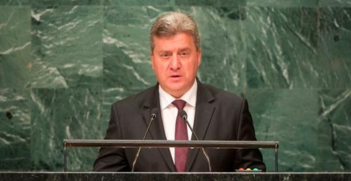Europe's Challenge in the Western Balkans

Europe must assert its influence in the western Balkans to reduce the leverage of regional authoritarian powers. A more active presence in the region would advance the European Union’s objective for a free and peaceful Europe.
The endeavour for a free and peaceful Europe that is committed to democracy and human rights has been the cornerstone of European reconciliation in the aftermath of the Second World War. Initially, only Western Europe was the focus. The creation of the European Coal and Steel Community brought together the Benelux countries, France, Germany, and Italy to ensure lasting peace. Since then, the European project has expanded to include the post-communist states of the Warsaw Pact. These states are committed to maintaining peace and fostering cross-border economic cooperation with the bloc’s western members.
While the integration of European national economies has eliminated warfare between member states, the European Union has been slow in spreading its liberal principles and values to its periphery. This is particularly the case in the western Balkans, where nationalism, political polarisation, and corruption have complicated the European Union’s ability to fully extend its liberal democratic values to the region. The decrepitude of the international security environment, compounded by Donald Trump’s unilateralist, isolationist foreign policy – notably, withdrawing American troops from northern Syria and withdrawing the United States from international arms control architecture – has subsequently weakened Europe’s security neighbourhood and increased the geopolitical leverage of authoritarian powers, particularly Russia and Turkey.
Already, these powers are seeking to assert their political and economic influence in Europe’s periphery. Indeed, a geopolitical chess game is being played by Russia and Turkey in the western Balkans. Situated on the fringes of Europe, in between the Black and Mediterranean seas with proximity to the Middle East, the Balkans are naturally of geostrategic importance for the advancement of the interests of Moscow and Ankara. Harnessing their control over the region will allow both authoritarian powers to further increase their influence vis-à-vis the EU.
In seeking to leverage its geopolitical influence in the western Balkans, Russia is seeking to curb the regional expansion of Euro-Atlantic institutions. For Russia, the western Balkans are of great cultural and religious importance. Indeed, the Balkans are the region from which Russia has borrowed all the sacral features of its stately existence – Christianity, the double hedged eagle in its coat of arms, and the title of Russian tsars.
Interference has been Russia’s instrument of choice to slow the West’s influence in the western Balkans. In embracing the role of a spoiler against the EU’s interests in the region, Russia has sought to sow discord in the uneasy tripartite Bosnia and Herzegovina. Vladimir Putin sees the current leader of Republika Srpska, Milorad Dodik, as the most viable channel for advancing Russian influence. The Kremlin has given Dodik unconditional support to help achieve his goal of dismembering Bosnia and Herzegovina. In particular, Putin has encouraged separatist instincts by training Republika Srpska police and paramilitary militia, while providing Dodik with loans and funds for his political campaign. This Russian meddling has consequently heightened tensions between Sarajevo and Banja Luka.
Russia has also made energy its main tool for strengthening its economic influence in the western Balkans. Russia holds an energy monopoly in Serbia, Republika Srpska, and Northern Macedonia, where it controls the Trans Balkan Pipeline. Russia has also sought to increase its influence by acquiring financial stakes in the main energy companies in the region. This was the case in 2009, when Russia’s state-owned energy company Gazprom acquired a 51 percent stake in the Serbian Naftna Industrija Srbije for €400 million.
Turkey has also covetously viewed the western Balkans, as it sees the region as part of Turkey’s geographical and emotional hinterland. This stems from Ankara’s assertion that the western Balkans were at the centre of the Turkish Ottoman Empire, with many of its leaders and bureaucracy coming from families with Balkan roots. Forced population transfers and voluntary migration between the western Balkans and present-day Turkey have created large diasporas on both sides. The essence of this historic relationship has meant that the current leadership in Ankara has made this region a key priority for the promotion of Turkey’s interests west of the Bosporus.
By engaging in conflict resolution and establishing economic and cultural ties, Turkey has been able to build its power base in the predominantly Muslim and Christian countries of the region. This has been particularly the case in Bosnia and Serbia, two states with Muslim and Christian communities. By arbitrarily engaging in easing tensions between Sarajevo and Belgrade, through numerous trilateral summits and bilateral visits, Ankara has been able to deepen ties with both countries. Indeed, the volume of Turkish trade with the two countries has increased exponentially – bilateral trade between Ankara and Sarajevo in 2003 was $71.6 million and in 2018 was estimated at $661.45 million, while in 2011 the volume of trade between Ankara and Belgrade was $588.32 million, and in 2018 it was $1.2 billion.
Besides deepening political and economic ties, Turkey’s has paid special attention to increasing the soft power influence of Turkish education in the region. Ankara has established Maarif public schools in Albania, Bosnia, Kosovo, and Northern Macedonia, where secular values are not enshrined in curricula. Turkey’s influence in the education sector is such that in 2011, Ankara succeeded in putting pressure on the Kosovar authorities to change their negative portrayal of the Ottomans as fierce invaders in their history textbooks.
The influence of authoritarian powers in the western Balkans means that the EU must assert its influence in the region to prevent Russia and Turkey from increasing their geopolitical influence. The European project based on strengthening peace, liberal democracy, and economic cooperation cannot allow the authoritarian leaders of Russia and Turkey, where liberal principles have been eroded, to increase their influence in the western Balkans and dismantle the EU’s efforts at Western state-building and democratisation. This enterprise has already been undermined by Russian military aggression in Crimea and Donbass, which has destabilised Ukraine’s sovereignty.
With Britain’s departure, the EU must clearly increase its efforts to maintain its ambition to integrate the western Balkans into the European project. Yet bilateral regional conflicts have undermined Brussels’ regional progress. These conflicts have included territorial claims between Kosovo and Serbia, and between Greece and Albania, as well as over the status of the Serbian Orthodox Church, which has led to tensions in Montenegro’s and Kosovo’s relations with Serbia. Increased European mediation in the region is needed to improve Brussels regional influence. The EU cannot afford to abruptly break off relations with the region, as was the case after the failure of the European Council to open accession negotiations with Northern Macedonia and Albania last year.
Under the leadership of Ursula von der Leyen, the EU has produced a package of more than €3.3 billion and a €1.7 billion programme to help the health sectors and economies of the western Balkans amidst the COVID-19 pandemic. Talks between Belgrade and Pristina have also recently resumed. European priorities should therefore remain assisting the western Balkans’ recovery from the pandemic and deescalating regional tensions.
Kareem Salem is a freelance journalist and holds a Masters in International Relations from the University of New South Wales in Sydney, Australia.
This article is published under a Creative Commons License and may be republished with attribution.





